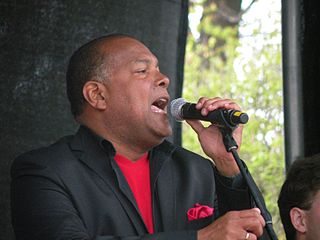
Efrén Eugene Benita, also known as Dave Benton, is an Aruban-born Estonian pop musician. He won the Eurovision Song Contest 2001 along Tanel Padar and 2XL with the song "Everybody" representing Estonia; becoming the oldest singer ever to win the contest.

Estonia has participated in the Eurovision Song Contest 29 times since making its debut in 1994. Its first appearance would have taken place in 1993 but a qualification round was installed for seven former Eastern Bloc countries hoping to make their debut in the contest, with Estonia failing to qualify. Estonia has won the contest once, in 2001. The current Estonian participant broadcaster in the contest is Eesti Rahvusringhääling (ERR).
Estonia was represented at the Eurovision Song Contest 1994 with the song "Nagu merelaine", composed by Ivar Must, with lyrics by Leelo Tungal, and performed by Silvi Vrait. The Estonian participating broadcaster, Eesti Televisioon (ETV), organised the national final Eurolaul '94 in order to select its entry for the contest. Ten songs competed in the national final and "Nagu merelaine" performed by Silvi Vrait was selected as the winner by a jury panel. This was the first-ever entry from Estonia in the Eurovision Song Contest, and the first-ever entry performed in Estonian in the contest.
Estonia was represented at the Eurovision Song Contest 2003 with the song "Eighties Coming Back", written by Vaiko Eplik, and performed by the band Ruffus. The Estonian participating broadcaster, Eesti Televisioon (ETV), organised the national final Eurolaul 2003 in order to select its entry for the contest. Ten songs competed in the national final and "Eighties Coming Back" performed by Claire's Birthday was selected as the winner by an international jury panel. The band was later renamed as Ruffus for Eurovision.
Estonia was represented at the Eurovision Song Contest 2006 with the song "Through My Window", written by Pearu Paulus, Ilmar Laisaar, Alar Kotkas, and Jana Hallas, and performed by Sandra Oxenryd. The Estonian participating broadcaster, Eesti Televisioon (ETV), organised the national final Eurolaul 2006 in order to select its entry for the contest. Ten songs competed in the national final and "Through My Window" performed by Sandra Oxenryd was selected as the winner by a jury panel.

The Eurovision Young Musicians 1998 was the ninth edition of the Eurovision Young Musicians, held at Konzerthaus in Vienna, Austria, on 4 June 1998. Organised by the European Broadcasting Union (EBU) and host broadcaster Österreichischer Rundfunk (ORF), musicians from eight countries participated in the televised final. Austria and broadcaster ORF previously hosted the contest at Musikverein in 1990. A total of eighteen countries took part in the competition therefore a semi-final was held two days earlier. All participants performed a classical piece of their choice accompanied by the Vienna Radio Symphony Orchestra, conducted by Dennis Russell Davies.
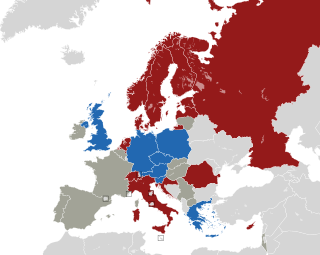
The Eurovision Young Musicians 2002 was the eleventh edition of the Eurovision Young Musicians, held at Konzerthaus in Berlin, Germany, on 19 June 2002. Organised by the European Broadcasting Union (EBU) and host broadcaster Zweites Deutsches Fernsehen (ZDF), musicians from seven countries participated in the televised final. A total of twenty countries took part in the competition. All participants performed a classical piece of their choice accompanied by the Deutsches Symphonie-Orchester Berlin, conducted by Marek Janowski. Romania made their début while Italy returned to the contest for the first time since 1990.
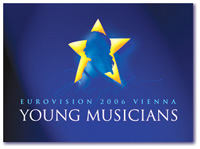
The Eurovision Young Musicians 2006 was the thirteenth edition of the Eurovision Young Musicians, held at the Rathausplatz in Vienna, Austria, on 12 May 2006. Organised by the European Broadcasting Union (EBU) and host broadcaster Österreichischer Rundfunk (ORF), musicians from seven countries participated in the televised final. This was the first time that the competition was held on an open-air stage and was the beginning of the annual Vienna Festival. Austria and broadcaster ORF previously hosted the contest in 1990 and 1998.
Estonia was represented at the Eurovision Song Contest 2004 with the song "Tii", composed by Priit Pajusaar and Glen Pilvre, with lyrics by Aapo Ilves, and performed by the group Neiokõsõ. The Estonian participating broadcaster, Eesti Televisioon (ETV), organised the national final Eurolaul 2004 in order to select its entry for the contest. Ten songs competed in the national final and "Tii" performed by Neiokõsõ was selected as the winner entirely by a public vote. This was the first-ever entry performed in Võro in the contest.
Estonia was represented at the Eurovision Song Contest 2002 with the song "Runaway", written by Pearu Paulus, Ilmar Laisaar, Alar Kotkas, and Jana Hallas, and performed by Sahlene. The Estonian participating broadcaster, Eesti Televisioon (ETV) organised the national final Eurolaul 2002 in order to select its entry for the contest. In addition, ETV was also the host broadcaster and staged the event at the Saku Suurhall in Tallinn, after winning the previous edition with the song "Everybody" performed by Tanel Padar, Dave Benton, and 2XL.
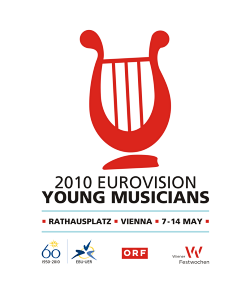
The Eurovision Young Musicians 2010 was the fifteenth edition of the Eurovision Young Musicians, held at the Rathausplatz in Vienna, Austria, on 14 May 2010. Organised by the European Broadcasting Union (EBU) and host broadcaster Österreichischer Rundfunk (ORF), musicians from seven countries participated in the televised final. This was the third time that the competition was held on an open-air stage and was the beginning of the annual Vienna Festival. Austria and broadcaster ORF previously hosted the contest in 1990, 1998, 2006 and 2008.
Estonia was represented at the Eurovision Song Contest 2001 with the song "Everybody", composed by Ivar Must, with lyrics by Maian Kärmas, and performed by Tanel Padar, Dave Benton, and the group 2XL. The Estonian participating broadcaster, Eesti Televisioon (ETV), organised the national final Eurolaul 2001 in order to select its entry for the contest. Eight songs competed in the national final and "Everybody" performed by Tanel Padar, Dave Benton, and 2XL was selected as the winner by a jury panel.
Estonia participated in the Eurovision Song Contest 2012 with the song "Kuula" written by Ott Lepland and Aapo Ilves. The song was performed by Ott Lepland. The Estonian broadcaster Eesti Rahvusringhääling (ERR) organised the national final Eesti Laul 2012 in order to select the Estonian entry for the 2012 contest in Baku, Azerbaijan. The national final consisted of three shows: two semi-finals and a final. Ten songs competed in each semi-final and the top five from each semi-final as determined by a jury panel and public vote qualified to the final. In the final, the winner was selected over two rounds of voting. In the first round, a jury panel and a public vote selected the top two to qualify to the superfinal. In the superfinal, "Kuula" performed by Ott Lepland was selected as the winner entirely by a public vote.
Estonia participated in the Eurovision Song Contest 2014 with the song "Amazing" written by Timo Vendt and Tanja. The song was performed by Tanja. The Estonian broadcaster Eesti Rahvusringhääling (ERR) organised the national final Eesti Laul 2014 in order to select the Estonian entry for the 2014 contest in Copenhagen, Denmark. The national final consisted of three shows: two semi-finals and a final. Ten songs competed in each semi-final and the top five from each semi-final as determined by a jury panel and public vote qualified to the final. In the final, the winner was selected over two rounds of voting. In the first round, a jury panel and a public vote selected the top two to qualify to the superfinal. In the superfinal, "Amazing" performed by Tanja was selected as the winner entirely by a public vote.
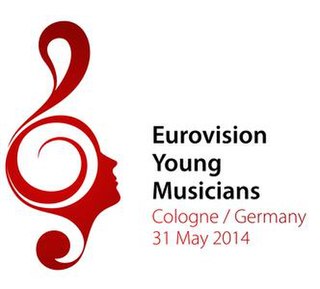
The Eurovision Young Musicians 2014 was the seventeenth edition of the Eurovision Young Musicians, held outside the Cologne Cathedral in Cologne, Germany, on 31 May 2014. Organised by the European Broadcasting Union (EBU) and host broadcaster Westdeutscher Rundfunk (WDR), musicians from fourteen countries participated in the televised final. This was the fifth time that the competition was held on an open-air stage. Germany previously hosted the contest in 2002.
Estonia participated in the Eurovision Song Contest 2015 with the song "Goodbye to Yesterday" written by Stig Rästa. The song was performed by Elina Born and Stig Rästa. The Estonian broadcaster Eesti Rahvusringhääling (ERR) organised the national final Eesti Laul 2015 in order to select the Estonian entry for the 2015 contest in Vienna, Austria. The national final consisted of three shows: two semi-finals and a final. Ten songs competed in each semi-final and the top five from each semi-final as determined by a jury panel and public vote qualified to the final. In the final, the winner was selected over two rounds of voting. In the first round, a jury panel and a public vote selected the top three to qualify to the superfinal. In the superfinal, "Goodbye to Yesterday" performed by Elina Born and Stig Rästa was selected as the winner entirely by a public vote.

Russia has participated in the biennial classical music competition Eurovision Young Musicians 9 times since its debut in 1994. After missing three contests from 2012 to 2016, Russia earned their first win with pianist Ivan Bessonov at the 2018 contest. Prior to that, the country's best result had been four third-place finishes, in 2000, 2004, 2006 and 2010.

Estonia has participated in the Eurovision Young Dancers 4 times since its debut in 1993.

The Eurovision Young Musicians 2018 was the 19th edition of the Eurovision Young Musicians contest. This edition was a co-production between the European Broadcasting Union (EBU), the Edinburgh International Festival, and the British Broadcasting Corporation (BBC) as host broadcaster. It was hosted in the United Kingdom, for the first time since the inaugural contest in 1982. Musicians representing eighteen countries participated in the contest, with Albania making their debut alongside seven returning countries, while Austria decided not to participate for the first time.
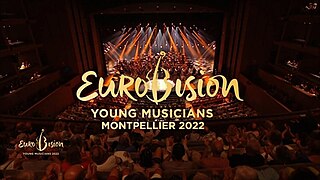
The Eurovision Young Musicians 2022 was the 20th edition of the Eurovision Young Musicians. It took place at the Corum in Montpellier, France, on 23 July 2022. The live show was hosted by French playwright Judith Chaine and Belgian radio presenter Vincent Delbushaye, with the Montpellier Occitanie National Opera Orchestra conducted by Pierre Dumoussaud. Organised by the European Broadcasting Union (EBU), this edition was co-hosted by French broadcasters Radio France and France Télévisions, as part of a summer series of music events called Festival Radio France Occitanie Montpellier.










